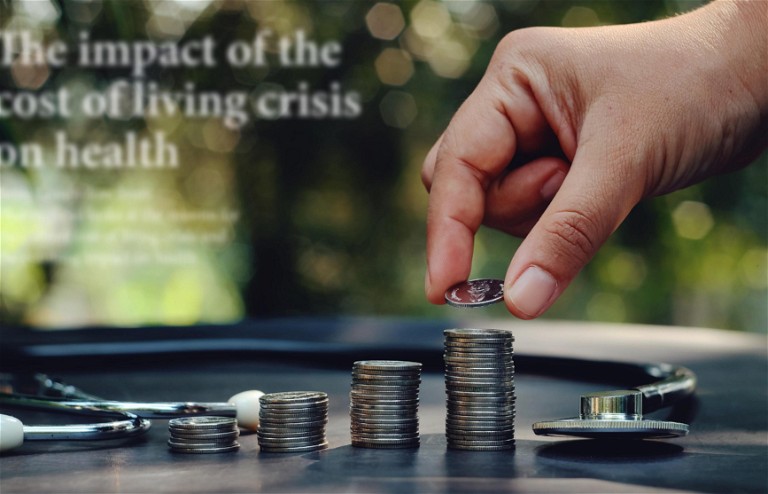Industry Insight
The impact of the cost of living crisis on health
Betsy Goodfellow from Pharmafocus looks at the reasons for the current cost of living crisis and the resulting impact on health

Various factors, including the war in Ukraine and the COVID-19 pandemic, have caused food prices, energy bills and other costs to soar over the last year, resulting in a ‘cost of living crisis’. Salaries are failing to rise with inflation, leaving many struggling to make ends meet. As well as the obvious financial concerns of such a crisis, there is also the added worry of how this may be impacting people’s health.
According to the Office for National Statistics (ONS), in the UK, the price of consumer goods and services increased at the fastest rate in the last four decades in the year leading up to October 2022, and the annual inflation rate rose to 7.9% in the year to May 2023 from 7.8% in the year to April 2023.1In addition, private rental prices increased by 5% in the year to May 2023, up from 4.8% in the year to April 2023, marking the largest annual percentage change since the ONS began recording this data in January 2016.1
But how have these increases impacted people’s health?
According to a recent poll commissioned by the Royal College of Physicians (RCP), 55% of the British population feel that their health has been negatively impacted by the rising cost of living,2 with 84% citing increased heating costs, 78% citing the rising cost of food and 46% citing rising transport costs.2
Discussing the results of this poll, Dr Andrew Goddard, president of the RCP, said: “The cost of living crisis has barely begun so the fact that one in two people is already experiencing worsening health should sound alarm bells, especially at a time when our health service is under more pressure than ever before. […] We can’t continue to see health inequality as an issue for health directives to solve. A cross-government approach to tackling the underlying causes of ill health will improve lives, protect the NHS and strengthen the economy.”2
As the cost of living increases, this impacts health in various ways. People in lower income groups are less able to buy good quality, nutritious food, turning instead to lower cost food that can be of a lower quality. As of April 2022, there was an 11.5% increase in ready meal sales, suggesting that in times of financial burden people are turning to cheap and convenient food.3 These pre-prepared meals not only save money, as purchasing raw ingredients can be costly, but also limit preparation costs, as a few minutes in the microwave is much less expensive than powering an oven or hob for long enough to cook a meal. It was also estimated in April 2022 that 7.3 million adults and 2.6 million children were ‘food insecure’, meaning they lacked reliable access to affordable and nutritious food.4 It is clear that the cost of living crisis has led to an increase in food insecurity and a decrease in the quality of food that people are eating, and there is an obvious link between this and poorer health.
Additionally, heating prices have risen exponentially; between January and March 2023 inflation for gas and electricity reached 129.4% and 66.7% respectively,5 with 56% of people reportedly using less fuel in their homes as a result.5 Although this saves money, it was estimated in 2022 that when household temperatures in Britain drop below 18ºC, each one degree drop in temperature corresponds to 3,500 additional deaths.6 A lack of heating can make various underlying conditions worse, such as cardiovascular disease, asthma, respiratory infections and mental health issues, and can also make it more difficult to sleep. It is known that sleep is important for maintaining good health.6

“ The cost of living crisis is indisputably a health crisis too, and as the public calls on the government for assistance, help and advice are available from various charities. ”
AgeUK suggests batch cooking food to conserve energy rather than turning to less nutritious convenience food; having showers instead of baths and lighting only the room that is in use.7 In addition, in winter, keep windows and doors shut, wear layers and keep moving to help reduce energy consumption.7
As well as these direct health impacts, the cost of living crisis is placing further strain on the already over-stretched NHS, with growing numbers of hospital admissions and appointments for those with health problems triggered by the increased cost of living.7 The junior doctors and nurses strikes have also had an effect on the NHS’s ability to cope with this rise in patient numbers.
Commenting on the cost of living crisis, Julian Tang, a clinical virologist at the University of Leicester, UK, said it “will culminate in higher admissions to the NHS for the exacerbation of these chronic conditions due to the cold, inability to heat their homes and inability to eat enough – with possible malnutrition, particularly in children, as people have to buy cheaper and less healthy foods due to rising food bills – and the additional burden of returning seasonal respiratory virus infections”.8
The cost of living crisis is indisputably a health crisis too, and as the public calls on the government for assistance, help and advice are available from various charities.
References:
- Visit: ons.gov.uk/economy/ inflationandpriceindices/articles/costofliving/ latestinsights
- Visit: rcp.ac.uk/news/press-release-overhalf-brits-say-their-health-has-worseneddue-rising-cost-living#:~:text=Over%20 half%20of%20Brits%20%2855%25%29%20 feel%20their%20health,commissioned%20 by%20the%20Royal%20College%20of%20 Physicians%20%28RCP%29
- Visit: grocerygazette. co.uk/2022/04/01/29788/#:~:text= Convenience%20trends%20have%20 returned%20with%20an%2011.5%25%20 uptick,convenient%20meals%20have%20 now%20reached%20a%20five-year%20high
- Visit: thelancet.com/journals/lanpub/article/ PIIS2468-2667(22)00120-7/fulltext
- Visit: ons.gov.uk/economy/ inflationandpriceindices/articles/ costoflivinginsights/energy
- Visit: theguardian.com/society/2022/sep/01/ how-turning-the-heat-off-this-winter-coulddamage-your-health
- Visit: ageuk.org.uk/information-advice/ health-wellbeing/cost-of-living-crisis-health/
- Visit: theguardian.com/society/2022/aug/08/ cost-of-living-crisis-will-add-strain-tocreaking-nhs-experts-warn